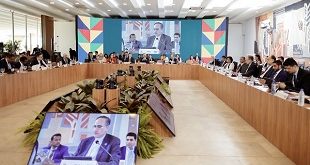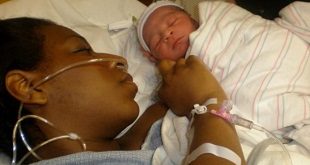
By Flavia Nassaka
Former presidential candidate recalls 2011 race, says a candidate needs great motivation to overcome challenges
Norbert Mao, the 47-year old president general of the opposition Democratic Party (DP) has a natural charisma, eloquent public speaking, and ambition. In 2011, he was DP’s flag bearer in the presidential race but came third after winning a paltry 1.86% of the vote.There were five candidates. And President Yoweri Museveni won with 68.3% of the vote. Since then people have asked why a politician of his caliber, failed to rouse the nation to back him. That is the question I asked him in a recent interview.
Mao spoke of the challenges he faced but says, as always, he was not going to let them put him down. He says his motivation was bigger.
He told me: “When going for a political race, I ask myself what is it that I can’t do unless I am president. There are certain things you can’t do unless you are in a certain position. For instance I can only appoint men and women of high integrity and professionalism to the cabinet when I am president and If I want the civil service to be cleaned, I must be able to appoint permanent secretaries capable of doing this which is an exclusive role of the president”.

We were seated on classy black sofas in his spacious, well-furnished office – its thick woolen carpet a stark contrast to the floor in corridor which has patches of worn out cement. And Mao was resplendent in navy blue suit accompanied with brown platform shoes.
It was Tuesday and as is tradition, the DP held its weekly press conference at the headquarters and for an hour Mao addressed the press; tackling a number of issues ranging from internal wrangles within the party and preparations for the 2016 elections. His office is right next door to the conference room but as he left the podium, Mao was mobbed by people one after another along the way. He shook several hands, exchanges pleasantries, smiled, and made promises. Although, the morning activity had taken its toll, the lawyer cum politician welcomes me with his signature smile as he jokes about his party headquarters. He says they are ‘state of the art’ but it in jest as anyone can see they have seen better days.
By nature, Mao says he likes taking action especially when he sees things getting messed up. He points out that seeing that the presidency was being abused, he over looked the party internal conflicts, and stepped forward for the voters to decide.
Tough Campaigns
He says he understood that the task ahead was not an easy one and that is why he registered a company dubbed, “Mao Political Action Committee (MPAC)” which ran his website, handled the fundraising drives, manifestos. He says this saved him the burden of dealing with money and direct mobilisation.
“I moved without a shilling on me. Whenever a team member asked for a drink, I would refer them to my personal assistant,” he said. Back in 2011, the electoral law mandated the Electoral Commission to provide each presidential aspirant with police escorts and security, two campaign vehicles, and Shs20 million to run the campaign.
Mao says the money is too little for a presidential campaign. He says he spent about a billion shillings in the three months as he traversed the country. He says fuel being his biggest expenditure.
“We started with 14 vehicles but by the time we finished, we had reduced them to 10. Although in areas where DP had a stronghold, I would have a fleet of over 20 cars as many of them were fueled by supporters,” he said. Of the 112 districts in the country, he missed three – Mpigi because he got involved in an accident, Luweero because of lack of coordination with the locals, and Ntungamo where authorities told him President Yoweri Museveni was in the district visiting his wife so he could not hold a rally there.
Mao whose campaign was largely run by volunteers says if it was not for an organised team, he would not have made it. Several months before the campaign, he says, they did a countrywide outreach which they called the `100 Days Programme’. This was meant to alert DP supporters that he was standing. At the same time they formed a Facebook page that gathered up to 400,000 likes.
“This helped me a lot because when I went back, I didn’t start from zero”.
Mao developed a schedule for the three months. His typical day in all the districts started with a meeting which would kick off as early as six in the morning. It’s during these meetings that he would be briefed about the local issues affecting a specific area. He barely had a timely or a decent meal. He became a good customer of road side stalls as water, roasted meats and banana (Gonja) always comprised his lunch menu. He says it was his opponent, Dr. Kizza Besigye,who tipped him to carry packed food. The tactic, Mao recalls Besigye saying, was working for him.
Suddenly, right there in the middle of the interview, Mao turns quite rueful. He goes really quiet and says with the smile.
“This campaign brought out the best in me. I never felt sick despite the stress.”
He recalls when his programmes ground to a standstill yet he had money that he could not use at the moment. It was on his mobile phone and the only mobile money operator in Karugutu, a small town between Kabarole and Bundibugyo districts could only avail him Shs30,000 (approx. US$10). “The day I almost went crazy was when I woke up and there was no mobile money network. I had to pay the bills but couldn’t. The only 50 million I had was on the phone. You know I had applied to Bank of Uganda to have bulk cash on my phone because some districts had no bank branches.”
Mao’s last rally was held in Nalukolongo in Rubaga South constituency in Kampala. It was two days to Election Day so he had to move to Gulu his home district because it’s where he had registered to vote from. While there, Mao told The Independent, he prayed like he had never done before. This gave him courage to believe that he had done his best.
Shattering stereotypes
Mao recalls that the campaign was not easy for him. He had just been elected DP president amidst controversy. Some members especially from Buganda region did not approve him, an Acholi, as their new leader since the party had since it’s initiation in the 1960s been headed by Baganda. Those who could not stand him as their president broke away and formed a faction – DP suubi. They set about attacking his campaign.
“Some DP members distorted my message. They spent time accusing me of being a mole planted by NRM. They confused the voters but I didn’t stop explaining to them and clarifying”.
One moment stood out for him. It was in Nakaseke, central Buganda during question time. Mao said one voter asked him whether he was not “one of those Acholi who used to slaughter innocent Ugandans”. Mao says the tribal stigma and stereotype was a major challenge especially in the south where anti-north sentiments are still very strong.
Lessons
Mao says he regretted walking out of the coalition as the opposition was divided. He says this weakened the opposition.
“I have always wondered how to build a credible coalition but I learnt that just like a marriage, you don’t kick out your wife at the slightest disagreement”.
He emphasises that unity is strength when confronting an entrenched regime as the NRM. He says throughout the campaign, he relied on the advice his boxing coach gave him while still a student at Namilyango College. His coach told him: “However much you feel like fleeing the ring, always say to yourself I will fight one more round”. And he did.
 The Independent Uganda: You get the Truth we Pay the Price
The Independent Uganda: You get the Truth we Pay the Price



